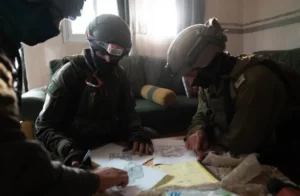The three conservative justices on the court unanimously rejected the families’ claims that demolishing a home is a disproportionate punishment, instead acknowledging it as a regrettable consequence.

The High Court of Justice on Wednesday approved the demolition of the houses of two Palestinians involved in the murder of Vyacheslav Golev, a 23-year-old security guard at Ariel University at the end of April.
The terror attack – April 27
Golev was a Beit Shemesh resident from a haredi (ultra-Orthodox) family and a student at the university.
He was guarding the entrance of the West Bank settlement with his fiancée, Victoria Fiegelman. When the attackers began shooting, he shielded her with his body, saving her life.
To demolish or not demolish?
Justices Yosef Elron, Alex Stein and Gila Kanfei-Steinitz’s unanimous ruling rejected the objections of the families of the terrorists who claimed that they were unaware and had no connection to the incident.
Further, the families have claimed that destroying two multi-story buildings was a disproportionate punishment and that, at most, one residence used by each terrorist could be demolished.
In contrast, the justices, including Kanfei-Steinitz in one of her first major rulings since joining the court, said that all of the residents in the small multi-story buildings were extended family members.
Adding that weaponry connected to the attacks was found in the residences, the justices said it did not matter if the family members were not connected.
Rather, they adopted the commonly-held argument that the purpose of the demolitions is to deter future attackers, not specifically to punish the family members.
The justices allowed the lawyers to present the argument that this was a regrettable indirect effect of house demolitions.
In addition, the court rejected claims that the current terror wave emanated from harsh Israeli tactics, such as house demolitions.
Why this ruling matters
The ruling was significant as all three justices were appointed in recent years and are counted among the court’s growing conservative wing.
Golev was buried at the Derech Chaim Cemetery in Beit Shemesh.
His cousin Vladimir eulogized him, saying, “You served as an example of what a good person in this world is. You had such a big heart. We will all miss you very much.”
Beit Shemesh Mayor Aliza Bloch said, “You are a hero and you will be remembered as one. You died while protecting your fiancée and the people of Ariel.” Bloch added that the Golev family embodies the “Israeli story.”
In a statement released shortly after the killing, Prime Minister Naftali Bennett said, “We will remember Vyacheslav along with all our heroes. He was murdered while protecting his fiancée, who secured the checkpoint of the settlement with him, with his body and saved her life. This lovely couple just started their life together. Our hearts are broken.”
Golev’s fiancée, Victoria, was physically unharmed in the attack but was hospitalized for treatment of post-traumatic stress disorder.
Within days, security forces caught the two terrorists who killed Golev, in Qarawat Bani Hassan, a short distance from Ariel.
